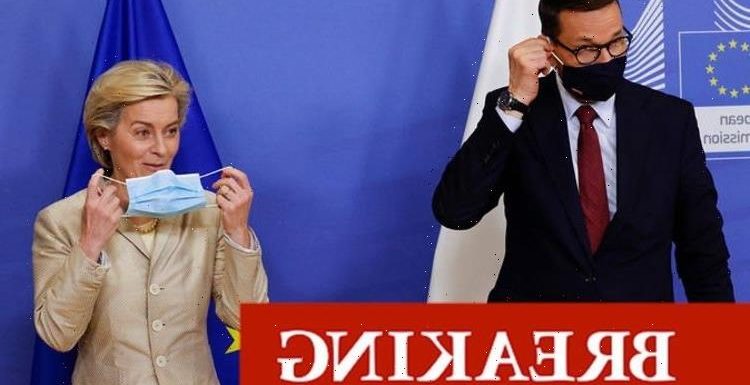
Marine Le Pen before a meeting with nationalist leaders in Warsaw, Poland
We use your sign-up to provide content in ways you’ve consented to and to improve our understanding of you. This may include adverts from us and 3rd parties based on our understanding. You can unsubscribe at any time. More info
The move was announced by Poland’s Prime Minister, Mateusz Morawiecki. The VAT will be suspended for four months as part of a second programme of measures to soften the blow of rising energy costs. It comes after the European Commission published a toolbox of measures ranging from emergency income support to households and state aid for companies to targeted tax reductions to tackle surging energy prices.

The toolbox took the form of a Communication of the Commission, meaning that the EU did not exercise its legislative powers, but rather chose a policy instrument to promote a coordinated approach across the EU.
But Poland has now joined other countries in reducing VAT on bills to the minimum amount they can charge.
They have also made payments to vulnerable groups to help them cope with rising prices.
For example, Spain decided to temporarily reduce the VAT rate on energy bills from 21 percent to 10 percent for households with modest energy consumption.
EU regulations allow for a reduced rate with a minimum of five percent VAT or a standard rate with a minimum of 15 percent VAT.
Removing this minimum amount formed a key part of the Vote Leave campaign in the UK.
Writing in the Sun in 2016, Michael Governances and Boris Johnson said they promised that “fuel bills will be lower for everyone”.
They added that “when we Vote Leave, we will be able to scrap this unfair and damaging tax”.
The move in Warsaw comes as support for Poland to follow in Britain’s footsteps appear to have soared.
A recent statement by a conservative member of Poland’s parliament once again brought the issue of a possible Polish withdrawal from the European Union
Janusz Kowalski, a member of parliament for the hyper-conservative United Right coalition, stated that if the EU continues to treat Poland “like a colony,” then the country should look to Britain’s 2016 referendum for inspiration.
Kowalski believes Poland should reevaluate its own relationship with the EU by 2027.
While representatives for the ruling Polish Law and Justice (PiS) party have strongly denied any intentions to hold a referendum on Poland’s membership in the EU, the Polish opposition bloc claims that the comment made by the coalition member, “reveal the Polexit scenario that the PiS leader and his team are writing for Poland.”
Polish citizens seem to disagree with how legitimate these fears of a Polexit are.
According to the most recent Eurobarometer survey, 84 percent of supporters of the Civic Coalition, the opposition to PiS, fear a Polexit, while 89 percent of PiS supporters claim to have no fear of an exit.
Source: Read Full Article